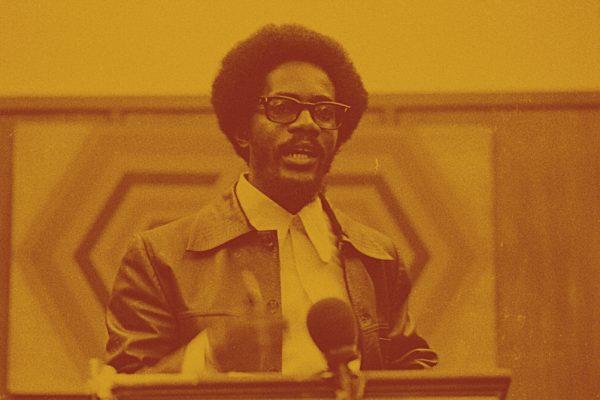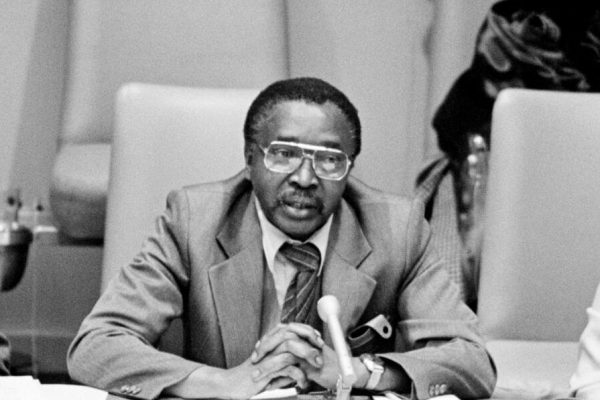Until recently, most progressives wrote off electoral politics in the South. But before the near-wins of Stacey Abrams in Georgia and Andrew Gillum in Florida, there was Chokwe Lumumba, a radical black lawyer and organizer who was elected mayor of Jackson, Mississippi’s capital, in 2013. His victory helped put Jackson on the map as a progressive city—a seeming contradiction in a state better known for its stubborn poverty, violent Confederate fan boys, and deeply entrenched black oppression.
The mayoral victories of both Lumumbas are not aberrations, but the fruit of more than a century of radical black organizing.
As much shock as Lumumba’s win elicited, it was decades in the making. Lumumba, a Detroit native with southern roots (like many black Detroiters), came to live in Jackson in the 1980s as part of a deliberate strategy to organize and build independent black power in the “Black Belt”—five southern states with a high percentage of African Americans (Louisiana, Mississippi, Georgia, Alabama, and South Carolina).
Black radicals had been experimenting with electoral strategies since the 1960s. In 2008 the Malcolm X Grassroots Movement (MXGM) studied the lessons learned from this work in the South and identified ways to advance movement goals. This work culminated in the 2012 publication of the Jackson-Kush Plan, which called for people’s assemblies (a grassroots co-governance model), an independent black political party, and a broad-based solidarity economy. Along the way, MXGM members identified Chokwe Lumumba to run for Jackson city council in 2009. He won, and by the time he ran for mayor four years later, he was well known, with an established infrastructure to support him.
Tragically, eight months into his term, Lumumba died. When his son, Chokwe Antar Lumumba, ran an unsuccessful special election bid to replace him, many were ready to write Jackson off once more. But then the younger Lumumba, only thirty-four, returned more experienced and better organized in 2017, riding an astounding 94 percent of the vote to become the city’s youngest mayor. Progressives were again pointing to Jackson as an example of how radical ideas could take hold, even in Mississippi.
The mayoral victories of both Lumumbas made international news. Most reports focused on the contrast between their progressive politics and Mississippi’s long, violent history of white supremacy. Yet these wins are not the aberrations they are portrayed as being. They are rather best understood as the fruit of more than a century of radical black organizing in the South.
While his father paid homage to this radical legacy, the younger Lumumba places special emphasis on it. His aim of making Jackson the “most radical city on the planet” has garnered a great deal of attention, as has his picture-perfect First Family: he has two young daughters with his wife, Ebony, an accomplished professor and activist. Their combination of elegance, humility, and affection has led many to draw comparisons to the Obamas.
Operating in the belly of the beast offers lessons for how to build power and use it to improve the lives of black citizens.
The realpolitik of governing in Mississippi is constricting in ways that progressives, especially radicals, can find difficult. What does it mean to seek justice and fair wages in a time of austerity? What does co-governance look like when folks don’t share key progressive values? To what extent do you work with the master’s institutions—such as public schools or the Democratic Party—because they reach the majority of our people? Operating in the belly of the beast tests us and our ideas. It also offers lessons for how to build power and use it to improve the lives of black citizens.
• • •
The political context that sets the stage for black governance in Mississippi goes back more than two centuries. Slavery, terror, and the forced removal and genocide of indigenous people are integral parts of U.S. history, but nowhere more than in Mississippi. Cotton production grew exponentially between 1820 and 1860. It in turn grew Mississippi’s wealth—and its enslaved population, which quintupled between 1830 and 1850 alone. By 1850 blacks outnumbered whites. White terrorism and violence—by law and by mob—was critical to controlling the black majority during and after legal slavery. There were more lynchings in Mississippi than in any other state, and enslaved blacks who fought against whites elsewhere in the country were often sent to Mississippi to be “broken” as punishment.
There were more lynchings in Mississippi than in any other state—but it was also the site of several black rebellions.
Despite this, Mississippi was the site of several black rebellions going back to at least 1729, when the French controlled it. Some of these rebellions were mounted in collaboration with indigenous peoples, most notably the Natchez nation. Although thousands of black families fled to relative safety in the North, the descendants of those who stayed are proud of their resistance. These black Mississippians will say, “We are the ones who didn’t run.”
Black resistance in Mississippi has taken many forms. Before he was assassinated in 1875, for example, Charles Caldwell worked as an organizer, state legislator, and captain of a military operation to defend black people in Hinds County (which includes Jackson) from white terrorists. Many of the organizing methods that we take for granted today—canvassing, targeted voter registration, marches—were developed and refined in the Black Belt. Decades before the modern civil rights movement, black Mississippians were building independent communities, protecting loved ones from white violence, and governing themselves. This legacy of resistance in Jackson—along with its large black population, its strategic position as the state capital and a major thruway, and its several black colleges and universities—helped draw MXGM organizers to the city.
Since its founding in 1821, Jackson has steadily elected Democrats, including a string of conservative Dixiecrats. It elected its first black mayor in 1997. But throughout the nineties and aughts, the elder Lumumba and his wife, Nubia—herself a savvy organizer who passed away in 2003—worked tirelessly under the auspices of MXGM to forge a strong Decades before the modern civil rights movement, black Mississippians were building independent communities and protecting loved ones from white violence. political and cultural community that was rooted in ideals far to the left of the DNC platform. Their work targeted the city’s many challenges, from high poverty and aging infrastructure to poor public health, bad schools, and a high crime rate.
What made the first Lumumba’s victory such a watershed moment— for both Jackson and the nation—was that he represented more than just a black face in a high place. He represented a movement offering an alternative vision where black people—especially working-class and poor black people—mattered.
• • •
Just days after his father’s memorial service, Chokwe Antar, then thirty-one, was drafted to run in the 2014 special election. It was a bruising campaign. His main Democratic opponent in the primary was Tony Yarber, a black minister with working-class roots and corporate backing who leveraged his pastoral alliances, anti-intellectualism, and age to paint Chokwe Antar as an inexperienced, anti-Christian, privileged transplant—even though he has lived in Jackson since he was a child. Yarber won by eight points, a margin delivered largely by Jackson’s small but united white voting bloc. For the MXGM coalition, it was a time for reflection and rebuilding.
Yarber proved to be a lackluster mayor and was beleaguered by scandals, including a lawsuit that alleged sexual harassment. Lumumba, by contrast, served on a board to address challenges with a downtown development project, conducted legal advocacy, and provided input and testimony on a range of public issues before the city council. Residents appreciated his persistence, and he became the obvious frontrunner for the 2017 mayoral race even before announcing his intention to run.
The new campaign was a formidable operation. Though it was multiracial and intergenerational, it was primarily black millennials, especially younger black women, who served as its leaders. Ebony ran the media campaign, which included a social media effort like no Jackson campaign before it. Lumumba’s sister, Rukia, served as campaign manager, placing a heavy emphasis on the ground game.
The younger Lumumba wanted to deflect the charge that he was simply following in his father’s footsteps.
Lumumba’s campaign promise to make Jackson the “most radical city on the planet” deflected the charge that he was simply following in his father’s footsteps. The younger Lumumba wanted to surpass his father’s vision, making a more explicit commitment to cooperatives, offering a clear plan for innovating city government and the people’s assemblies (a pillar of the Jackson-Kush Plan), and committing to participatory budgeting. His campaign slogan, “When I become mayor, you become mayor” (adapted from Newark mayor Ras Baraka’s), inspired Jackson residents who felt locked out of their government. At the national level, the campaign won endorsements from trade unions and progressive political organizations such as the Working Families Party and Our Revolution. Lumumba beat eight candidates in the Democratic primary (including Yarber, who received only 5 percent of the vote) and then sailed through the final election.
At the inauguration, attendees were asked to swear a “people’s oath” of participation and co-governance, agreeing to “faithfully serve as a citizen and supporter of the city of Jackson. . . . Together, we will rebuild our infrastructure. We will create jobs for Jacksonians. We will provide holistic solutions to crime, and we will improve our educational system.”
• • •
Lumumba’s electoral victory was a powerful show of unity among Jackson’s black and progressive leadership. Pastors who had previously supported Yarber, for example, publicly apologized for their “error.” But it has not been easy for the Lumumba administration.
Kali Akuno, a former staffer under the elder Lumumba’s administration and a former leader of MXGM, has emerged as an outspoken critic. Akuno helped write the Jackson-Kush Plan and thinks Lumumba is not doing enough to engage with its main tenets—especially growing an independent black base. For critics such as Akuno, both MXGM and Lumumba prioritized electoral victories over the development of an independent black political party.
Lumumba’s critics believe that he prioritized electoral victories over the development of an independent black political party.
Mississippi, like most states, makes running as a third-party candidate challenging, and with the vast majority of Jackson voters registered as Democrats, the Democratic primary is now pretty much the only stage in town. Developing an independent party would require a different set of organizing and legal strategies. Of course, creative party organizing is not new to the city. Jackson was the headquarters of the 1964 Mississippi Freedom Democratic Party, led by Fannie Lou Hamer and Lawrence Guyot, which directly challenged the Democratic Party, though it was not a third party in the traditional sense.
Building “outside” formations—ones independent of mainstream parties—poses a stark challenge not just for Lumumba but for other progressive organizations: How do you win elections and continue to build an independent base to push the work forward and hold those you elect accountable? Few groups do both well. Many on the left who are fond of ideological purity find it hard to do the pragmatic, even messy, aspects of mass engagement: meeting people where they are, building awareness and support, dealing with limited resources, and being willing to educate across the political spectrum.
MXGM has continued to organize Jackson’s people’s assemblies, which have been recently revived under the leadership of the Democratic Visioning Committee (DVC). The DVC is a body of Jackson-based organizers and advocates (of which I am a part) cochaired by Lumumba’s sister, Rukia, and longtime MXGM leader Akil Bakari. The assemblies, organized around small group discussion, allow residents to discuss issues, communicate priorities, and speak directly to city officials—many of whom regularly attend, including the mayor and lead staff. Much of the meeting happens in small groups to allow for deeper debate among resident. Attendees have explored participatory budgeting, which kicks off as official city policy soon, and have also taken on crime and safety. Participants tend to share progressive values and neighborly good will, but the assemblies offer a constant reminder that the city is politically diverse.
Abolition is still a difficult topic for many Jacksonians since most tie safety to policing.
Perhaps the biggest test for the Lumumba administration has been policing—a progressive official’s third rail. Jackson has the sixteenth highest murder rate in the nation per capita. Chokwe Antar ran on a platform of prevention and prison alternatives, but abolition is still a difficult topic for many Jacksonians since most tie safety to policing. A rash of police-involved shootings last spring provoked a conversation about accountability. Activists wanted more than condemnation from the mayor. They asked him to use his authority to repeal the department’s policy that protected the names of the officers involved. Leadership of Jackson’s predominantly black police force, on the other hand, framed the policy as a workers’ rights issue.
Guided by his people’s governance framework, the mayor convened a task force to review the policy, solicit public feedback, and propose changes. The process took five months—light speed for bureaucracy, but an eternity for grieving family seeking justice. In the end, the commission negotiated a compromise requiring police to release the names of officers involved in shootings within seventy-two hours, so long as the officers were not operating undercover. Jackson is the only jurisdiction in the state of Mississippi with such a policy.
• • •
Last year, the Lumumba administration presented a strategic plan framed around creating a “Pathway to Human Dignity.” The document’s central tenet, the “Dignity Economy,” has five key components:
- Healthy citizens
- Affordable homes in safe neighborhoods
- Thriving educational system
- Growing tax base with occupational opportunities
- A city that is open and welcoming to visitors
It is certainly not the stuff of revolutions, but it led to improvements almost immediately. Nonessential city workers were finally able to come off monthly furlough last year (they had missed one Friday each month since 2015), and in September, workers received their first pay raise in years.
Does reform have a role in radical governance? The tension is ancient. Reform is only as good as the vision and plan it serves. It is about learning how power works, creating spaces to practice making decisions together, and easing suffering by controlling what we can. It is about learning to have faith that, as people not traditionally in power, we have the answers, the know-how, and the imagination required for the challenges ahead.
Anywhere that black people are working to govern together and navigate their differences for a better life for all has radical potential.
Chokwe Antar threw down the political gauntlet when he declared his intent to make Jackson the most radical city on the planet. Not yet two years into his administration, few expected to see a transformation. But there have been changes. Some came immediately, including an initiative to provide living-wage jobs to formerly incarcerated residents. Some has been slower but no less visible: Jackson voters helped sweep in an entire slate of black judges in Hinds County in November. Less tangible but just as real is that people take pride in their city.
These achievements may seem like baby steps, or even detours on the road to radical governance. But anywhere that black people are working to govern together and navigate their differences for a better life for all has radical potential.








